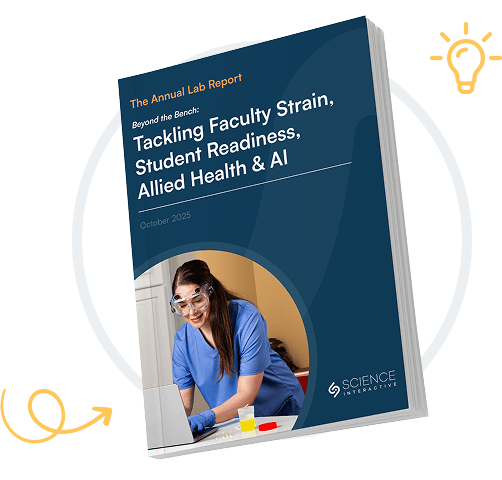Beyond the Lab Bench: Tackling Faculty Strain, Student Readiness, Allied Health & AI
STEM labs are at a turning point. As on-campus enrollment plateaus and online demand accelerates, the line between physical and virtual learning has all but disappeared. Institutions aren’t asking if they should offer online labs but rather how to make them just as rigorous, engaging, and effective.
The 2025 Annual Lab Report reveals what’s happening behind the scenes through the voices of instructors, students, and STEM leaders to show key challenges and where the biggest opportunities lie. Beyond enrollment trends, this year’s report explores:
- Faculty and student challenges impacting preparedness, confidence, and engagement
- Effectiveness across lab modalities, from on-campus to hybrid to fully online
- Pre-lab design strategies that build readiness and improve outcomes
- Allied Health growth, as programs scale to meet surging workforce demand
- AI’s growing influence, from grading and simulation to academic integrity and skill-building

What's Inside the Annual Lab Report
-
This year’s report reveals what’s really happening behind the scenes in science labs, and what it will take to sustain rigor, readiness, and access in the years ahead. Key findings include:
- Enrollment is shifting: On-campus growth has stalled, while 3 in 4 institutions report increases in online labs — proof that flexibility now drives demand.
- Preparedness is slipping: 9 in 10 instructors say students aren’t ready for lab, and nearly half of students admit they lack confidence.
- Faculty strain is rising: Two-thirds cite lab prep as a major burden, with half handling it alone.
- AI is reshaping labs: Half of instructors use AI for support; half have caught students misusing it, and 82% worry about academic integrity.
- Allied Health is booming: 88% of instructors and 80% of administrators report growing demand, but resources haven’t caught up.
Together, data shows science education evolving faster than most institutions can support.

Beyond the Bench: Insights from the Annual Lab Report
Join us Wednesday, November 12 for an in-depth look at what’s shaping the future of science education. This session brings together new research from Science Interactive’s 2025 Annual Lab Report and Quality Matters’ Changing Landscape of Online Education (CHLOE) report to explore how institutions are tackling the biggest challenges in both online and STEM learning today.
From enrollment trends to faculty strain and student preparedness, we’ll unpack this year’s key findings — and what they mean for the future of online education.
Don’t miss it. Gain research-backed insights and actionable strategies to make your learning experiences more scalable, equitable, and effective.

Here’s what 2,768 administrators,
instructors & students told us!
of students said they would enroll elsewhere if their lab wasn’t offered online, underscoring how flexibility now drives enrollment decisions.
of instructors highlighted student preparedness is a top challenge across modalities.
of students say hands-on labs make courses more engaging and help them retain information better.
of students report satisfaction with their online lab experience, though many say they struggle without immediate instructor or peer support.
of administrators plan to expand their online or hybrid Allied Health lab offerings in the next year, citing workforce demand as the driver.
of instructors report catching students misusing AI and 82% are concerned about its effect on academic integrity.

What It Means for Science Education
The data in the latest report makes clear that lab education is at an inflection point. Faculty strain, a lack of student preparedness, and shifting modalities are colliding, and the next few years will determine whether labs remain a source of stress or strength for institutions.
Science Interactive’s research points to three clear priorities for institutions ready to act:
- Simplify faculty workload. Centralize prep, supplies, and content delivery to give instructors their time back.
- Rebuild readiness. Make pre-labs active, personalized, and integrated into every course.
- Bridge access and rigor. Use online and hybrid models in ways that make science more flexible without compromising quality.
Labs don’t have to be a bottleneck. With the right design and support, they can be the heartbeat of scientific learning. Download the report for more strategies to stay ahead of the curve.


Request The Annual Lab Report
Methodology
This year’s findings are based on a nationwide survey of nearly 2,768 students, instructors, and STEM leaders from institutions of all sizes and formats, including community colleges, four-year universities, and fully online programs. The research explored key themes shaping science education, including enrollment trends, student preparedness, faculty strain, AI adoption, and Allied Health growth, to provide a clear, data-driven view of how labs are evolving across online, hybrid, and on-campus environments.